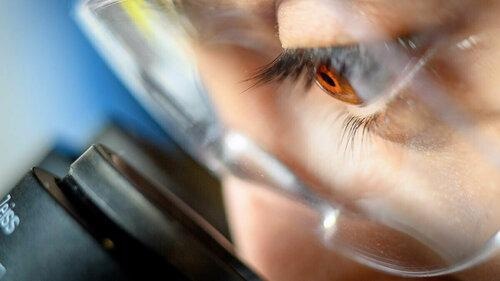Scientists from the University of Notre Dame have found a new way for tumor cells to transmit genetic material to other cells in their microenvironment, allowing cancer to spread.
 Research. Image Credit: Matt Cashore/University of Notre Dame
Research. Image Credit: Matt Cashore/University of Notre Dame
Crislyn D’Souza-Schorey, the Morris Pollard Professor in the Department of Biological Sciences, and colleagues found that DNA “cargo” is moved in small informational sacs called extracellular microvesicles in their latest research, published in Cell Reports. Their research builds on the work her lab has done to better understand the exchange of information between cells.
We’ve shown that DNA present in these microvesicles is related to metastasis, so now we have a great platform to assess for genetic aberrations.”
Crislyn D’Souza-Schorey, Morris Pollard Professor, Biological Sciences, University of Notre Dame
D’Souza-Schorey, is also affiliated with the Berthiaume Institute for Precision Health, the Boler-Parseghian Center for Rare and Neglected Diseases, and the Harper Cancer Research Institute.
Unlike normal cells, cancer cells are frequently packed with cytosolic DNA, which is the DNA found in the jelly-like fluid outside of the cell’s nucleus. This DNA can come from a variety of places, but new research shows that chromosomal instability is the most common source of cytosolic DNA in tumor cells.
The researchers used a male cancer patient’s cell model to demonstrate how Y-chromosomal DNA, which is available in the cytosol due to chromosomal instability, is handled by extracellular vesicles and transmitted to a female mammary epithelial cell line.
These female cells do not have Y-chromosomal DNA present without exposure to the male microvesicles. This is an accessible way to show people that the DNA was transferred, making it easier to prove this form of communication.”
James Clancy, Study First Author and Research Assistant Professor, Biological Sciences, University of Notre Dame
The researchers indicated that cytosolic DNA is transported to microvesicles by an enzyme known as cGAS, which was found in part due to its role in the immune response to bacterial and viral infections. Researchers have increasingly recognized that cGAS may play a role in tumor growth, and this recent study outlined how the DNA is altered to support that progression.
D’Souza-Schorey’s lab released a paper in Nature Cell Biology in 2019 that revealed how microRNA is transferred from tumor cells to microvesicles that are just starting to develop at the cell periphery. These vesicles are picked up by non-tumor cells in the microenvironment after they are shed. Microvesicles can also be discovered moving through the body in bodily fluids such as blood and urine, and they can be exploited as cancer biomarkers.
While microRNA has a faster impact on protein expression than DNA, the scientists were more concerned with the DNA content because it is the actual component of a person’s genome, including any tumor-related alterations, according to Clancy. Proving that DNA had migrated from one cell to another was likewise more difficult.
Continued fundamental research in this area by the lab could lead to the early detection of various forms of cancers.
Source:
Journal reference:
Clancy, J. W., et al. (2022) Recruitment of DNA to tumor-derived microvesicles. Cell Reports. doi.org/10.1016/j.celrep.2022.110443.